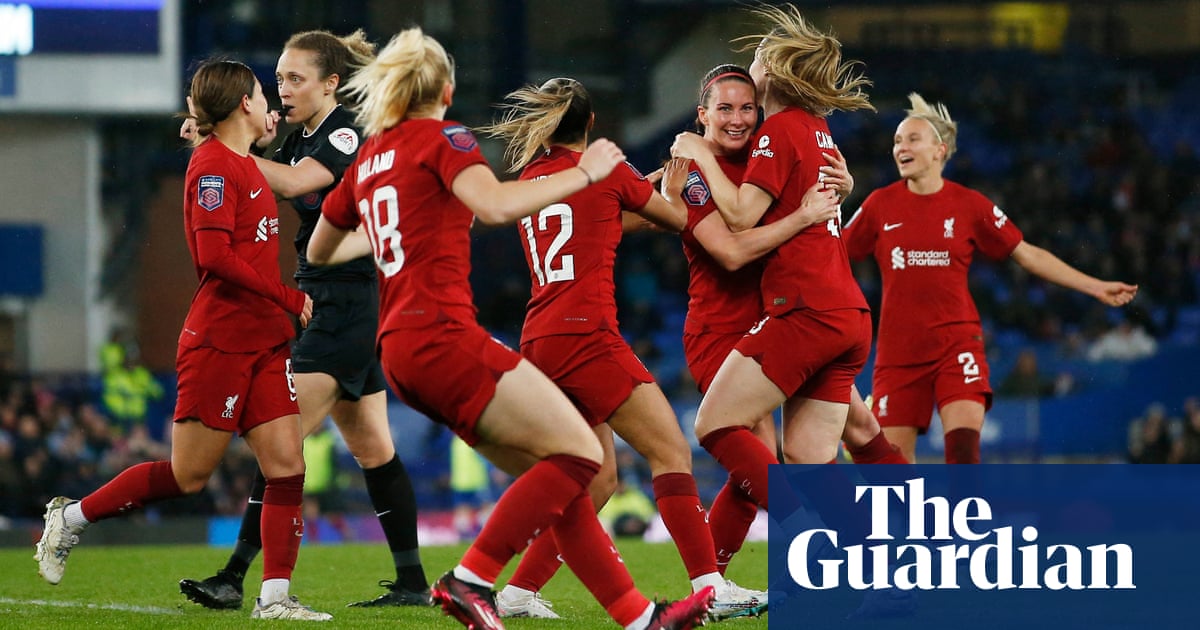
There will be many admirers of the frugal spending philosophy of Liverpool’s owner, Fenway Sports Group, especially with the men’s team top of the Premier League. For the club’s women’s team, however, languishing 19 points behind the leaders, Chelsea, as the Women’s Super League approaches the season’s halfway stage, is it time for FSG to rethink that model and inject more money to avoid falling further behind?
Admittedly, Matt Beard’s side’s 2024-25 campaign has been hindered by an extensive injury list that includes key players such as Marie Höbinger and Sophie Román Haug and an inability to convert their chances in early draws against Leicester, West Ham and Crystal Palace. But they are now on a four-game losing league run without scoring and their supporters will be frustrated to lie significantly closer to the relegation zone than the European places.
The club finished fourth last season, their best finish for seven years, amid much-deserved acclaim, but as the summer approached there was never really a sense that Liverpool intended to propel themselves to challenge for the title or Women’s Champions League places with a spending spree. It would be wrong to suggest the club did not spend significantly – they smashed their transfer record in July to sign the Canada forward Olivia Smith for a fee understood to be about £210,000 – but, despite this, their budget remains markedly lower than the WSL’s top sides.
It would also be wrong to suggest Liverpool’s owners do not care about the women’s game. It is believed that something close to £15m has been invested in the women’s team’s training base at Melwood, which was repurposed for the women’s team’s sole use in 2023. Those facilities are top-class. Additionally, big improvements have been made to their regular home stadium, compared with previous years when they were ground-sharing with Tranmere at the rather outdated Prenton Park. The club signed a 10-year lease to play at the more modern facility at St Helens this summer with a new pitch, and are providing free coach travel for fans to WSL away games, as well as to home games for supporters travelling from Liverpool and Wirral. Ticketing and commercial experts have been headhunted from Arsenal in an attempt to increase attendances and revenue.
Yet despite those good efforts, Liverpool feel miles behind their WSL rivals, and their latest defeat, by Arsenal on Sunday, leaves them 12 points from a European place with 12 games to go. Amid the injury crisis, could there be an injection of money in January to bolster the squad? When Beard was asked on Sunday whether he had any money to spend on reinforcements he replied: “No, not really.”
It is understood Liverpool are planning to do some business but no one is expecting them to spend the sort of money Chelsea did last January when, shortly after losing Sam Kerr to injury, they paid €450,000 to bring in the Colombia striker Mayra Ramírez from Levante and went on to win the league. What may frustrate Liverpool supporters most is that the money required to sign some of the world’s best players and build a team to challenge for trophies is minuscule compared with the vast sums spent in men’s football.
The expenditure of Liverpool’s women’s club for the 2022-23 campaign was £3.44m, according to their most recent financial accounts, published via Companies House. That was 0.61% of the more than £560m total expenditure of Liverpool FC. It also falls well below the £31.5m Liverpool spent on agents’ fees in the year from February 2023, albeit that figure is well below most of the rest of the so-called “big six” men’s clubs and, owing to the differences in the commercial climates in men’s and women’s football, such contrasts are not uncommon around the world.
But Arsenal, a longer-established top women’s side, outspent Liverpool more than threefold in 2022-23, with expenditure of £11.16m, and relatively little money for the industry can go a long way in the women’s game. The wage bill for Liverpool’s women’s players and staff, totalling £1.82m, was smaller than the salary of Liverpool’s highest-paid director, who received £2.24m in the year to June 2023. That disparity with directors’ pay is, again, not uncommon but when Liverpool are being outspent by teams such as Brighton in the WSL, at what stage will FSG decide to dive further into its pockets to try to compete?
When Beard was asked whether he was frustrated at that lack of funds for January, he was in no mood to criticise his club, saying: “I always say, it’s not always about the money – I think we 100% proved that last year.” Those above him at the club seem prepared to play a patient long game, nurturing a talented crop of youth internationals towards future success. The question is how long their supporters will remain so patient.












